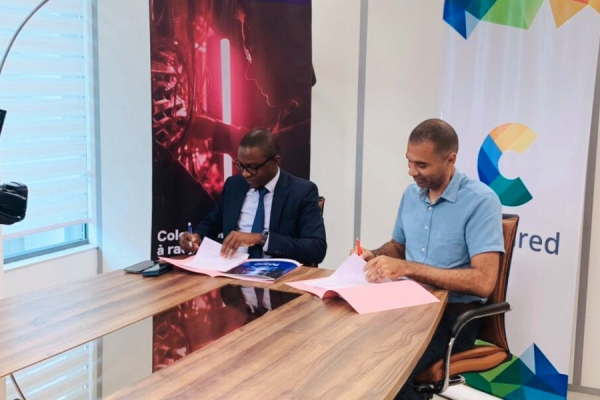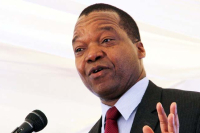The solution aims to help merchants with their transportation needs.
Garri is a digital solution developed by an Ethiopian startup. It allows shippers to easily and reliably move their goods anywhere within Ethiopia using carriers and drivers approved by the startup. The solution, launched in 2020, has raised $100,000 to support its growth.
It aims to eliminate freight logistics hassles by optimizing and digitizing every aspect of the industry. For that purpose, it developed mobile apps -for Android and iOS devices- to make the process easier. Shippers and drivers sign up and Garri handles driver approval to allow only trusted ones on its platform.
It explains that its “vetted drivers earn more money per trip, have a safer and more flexible work experience, and develop better relationships with transporters and shippers, with increased opportunity to own/operate their own truck.”
“Garri works to find round trips and multileg to minimize empty miles and maximize customer earnings,” it added.
Before booking a driver, shippers need to request a quote via the mobile app or the web platform. Once the price is agreed upon, Garri matches the shipment with the best carrier for the job. Then, when a driver is assigned to the shipment, the startup notifies the requester, who can then track the delivery in real-time. Upon successful completion, all paperwork is handed to the requester.
In 2022, Garri was selected among the 60 startups to participate in the second cohort of the Google for Startups Black Founders Fund for Africa, receiving a share of the $4 million support dedicated to the participants.
Adoni Conrad Quenum
Low Internet penetration and growing demand for broadband have attracted many international and local investors to the Democratic Republic of Congo. To meet the population’s demand, companies are joining forces to develop common strategies.
Last Friday, tech company CSquared and data center management operator Raxio signed a memorandum of understanding to improve Internet connectivity in the Democratic Republic of Congo.
Yannick Sukakumu (photo, left), Raxio's general manager in the DRC, says the MOU provides the missing piece for Raxio to serve its customers in the country. It will allow CSquared DRC to connect the various Raxio data centers to offer quality internet to clients.
The partnership is part of Raxio's ambition to deploy several data centers to host IT equipment, and critical communication infrastructures, among others. For CSquared, this collaboration is part of a coherent strategy to expand its footprint across Africa in a context marked by high demand for broadband connectivity on the continent.
"By building infrastructure such as fiber optics and data centers and connecting them with existing technology solutions and services, we believe we are building an ecosystem” that will support the creativity of our youth, which is in dire need of such support, said Alain Malanda (photo, right), manager of CSquared DRC.
Samira Njoya
The African video game market is currently growing steadily with a rising number of gaming communities being built on the continent. It is therefore important to create a framework to develop the sector and train future professional gamers on the continent.
On April 19, 2023, in Dakar, the Senegalese eSport promotion committee CONAPES and Senegal Digital (SENUM SA) signed a partnership agreement to promote eSport in the country. The agreement aims to allow access to digital development centers (ESS) for gamers.
On Twitter, CONAPES explains that the partnership is an opportunity to democratize eSport, but also an opportunity to offer training in professions related to gaming, in line with the digital inclusion so desired by and for the Senegalese youth.
Under the agreement, SENUM SA and CONAPES will build a network of 45 ESSs dedicated only to gaming. Therefore, gamers will access the resources available to all the ESSs present in the 14 regions, including 6,000 kilometers of fiber optic cable offering very high-speed internet. The main objective is to create 45 eSport Clubs (Pro Gamer), 45 eLeagues, and a national eSport competition, namely the Senum Esport Competition (SECO).
The partnership will also give CONAPES staff access to a vast training and mentoring program on professions related to electronic games, immersive sports, cybersports, techsport, and phygital sports including innovative technologies, artificial intelligence, drones, and exoskeletons...
For CONAPES, with such an agreement, Senegal becomes the first African country to launch a LAN network dedicated to competitive gaming.
Samira Njoya
Sourcing supplies has always been a challenging task for informal traders. The solution aims to address those challenges since its founder knows them very well for being the son of an informal trader.
Alerzo is a b2B solution developed by a Nigerian startup. It allows informal traders to easily source their supplies online. The startup, which founded the solution, was established in 2019, by Adewale Opaleye. Since its inception, it has raised about $16 million to improve its technology and accelerate growth.
“I started Alerzo to help my mom, a single mother who ran two informal retail stores to support me and my three siblings. Before Alerzo, she had to close her shop and travel for hours to buy inventory to stay in business. [...] Women are often victims of theft because street boys know retail store operators often carry cash. I wanted to apply what I learned in China to make life better for working mothers in Nigeria,” explains the founder.
Through its Android and iOS apps, merchants can easily access Alerzo's services. They first need to create their accounts. Then, they can browse the registered wholesalers, stock up in just a few clicks and get their goods delivered for free within 24 hours. “With Alerzo, informal retailers can receive and make cashless payments, track store profitability better and facilitate a portfolio of digital services,” the platform reads.
In 2021, the startup had a team of fewer than 250 people (according to Crunchbase data) and was working with about 150,000 informal merchants. In March 2023, it decided to lay off some of its staff because the economic environment in Nigeria was not what it projected it to be.
“Given previous market dynamics, we hired very aggressively during the past couple of years to fuel quick growth and expansion across the country. This does not align now with the economic environment today, so we, unfortunately, had to make changes to our business to be more focused around pursuing strong unit economics,” it said in a release.
Despite this lean period, Alerzo is not giving up on its expansion plans. The Nigerian e-commerce platform wants to expand across Africa and beyond.
Adoni Conrad Quenum
The solution was launched in Guinea under the brand name Evatis. However, its founder chose to continue the project to ease access to healthcare in his country, Djibouti.
Medyc is an e-health solution developed by a Djiboutian start-up. Thanks to integrated videoconferencing tools like Zoom and Google Meet, it allows access to healthcare for its users. It also offers specific services to companies and institutions.
The solution has no mobile applications yet, so users can access its services only by visiting its web platform. New patients have to register first before accessing those services. To book a service, individual users only have to log in -if they already have an account- and click on the “book an appointment” button in the upper right corner, select the service, the date, and the time. The services they can access range from teleconsultation to home care and medicine delivery.
Companies and institutions can access consulting services that support the development of personalized wellness programs for their employees. The healthtech solution also helps them digitize existing physical health records and even trains their teams on how to access those digital records. Medyc also enables hotel guests to receive medical consultations, care, and drugs during their stay.
According to the founder, Moubarik Mahamoud, about 30 patients are currently using Medyc's services. He says the Healthech solution, founded in 2019, is still in its pre-launch phase and collecting feedback to improve its services. It is also carrying out actions to allow easy access to its services for people without access to the internet. “Internet penetration has improved significantly thanks to pricing efforts. We are discussing with our telecom operator to make the platform data-free with our incubation center, CLE, which is leading the negotiations,” Moubarik Mahamoud told We Are Tech Africa.
Since its inception, the solution has completed a €107,000 funding round to support its growth. Apart from Djibouti, it is currently targeting the Ethiopian and Somalian markets since they are closer to its prime market and the demand for quality health services is growing in the regions. Another factor that motivated his choice for Ethiopia and Somalia to be the next stage in Medyc’s growth is the constant improvement of telecom infrastructures in those markets.
Adoni Conrad Quenum
Over the past five years, financial support for African technology startups has increased. Confidence in local innovators continues to grow and attract investors who are aware of the opportunities in the African digital economy.
Launch Africa is one of the most active investors in the African startup ecosystem, according to Africa: The Big Deal. Since launching operations in mid-2020, the pan-African venture capital fund has invested more than $31 million in 133 deals, averaging more than one deal per week. The check size of most of its deals ranges between $100,000 and $300,000, with a median check of $250,000.
So far, it has focused on 22 countries. Startups in four countries in particular Nigeria, South Africa, Kenya, and Egypt have alone attracted $21 million of its overall investments (in 89 deals).
Five other markets have attracted more than $1 million. They are namely Ghana, Senegal, and Côte d’Ivoire (in West Africa) as well as Tanzania and Tunisia. The investment team also went off the beaten path by identifying investments in often overlooked countries such as Togo, Sudan, and Angola.
Fintech was the sector in which Launch Africa invested the most with 42 deals (32%) valued at $11 million (36% of its overall investments) across 13 markets. In Nigeria, fintech attracted 13 deals.
Other sectors that attracted heavy Launch Africa’s investments were marketplaces, logistics, big data, and healthtech, each of which attracted between $3 million to $4 million in 15 to 20 deals. Transactions in marketplaces, logistics, and big data were made in about 10 markets. On the other hand, support for healthtech focused on 5 markets, with 7 transactions in South Africa.
Muriel Edjo
Due to the lack of confidence in its currency, Zimbabwe has decided to introduce a digital currency backed by gold. The currency is expected to let citizens store value and protect themselves from exchange rate volatility.
Zimbabwe will soon launch a gold-backed digital currency in an attempt to stabilize its fiat currency, whose continued depreciation against the U.S. dollar is strangling the economy, local media outlet The Sunday Mail reported last Sunday, citing Central Bank Governor John Mangudya (photo).
According to the media outlet, the central bank governor explained that the planned currency would enable people with tiny quantities of Zimbabwean dollars to trade their money for digital tokens to preserve value and hedge against currency fluctuation.
He said the current high volatility in the exchange rate is linked to expectations of an increase in the supply of foreign currency in the market, with the start of the tobacco auction season. Indeed, the Tobacco Industry and Marketing Board (TIMB) announced on March 8 that national tobacco production is expected to increase by 8.5% in 2023 to 230 million kg, thanks to good weather conditions and an increase in planted area.
Zimbabwe is facing a severe economic crisis since the early 2000s after former President Robert Mugabe's land reform broke up a key sector of the country's economy and forced it to stop repaying nearly $13 billion in debts to the World Bank, the African Development Bank (AfDB), the European Investment Bank (EIB) and Paris Club member countries.
The expropriation of white farmers discouraged foreign investment and led to a sharp drop in exports, prompting the Mugabe regime to start printing large amounts of money, leading to a long period of hyperinflation. Against this backdrop, the government was forced to abandon the Zimbabwean dollar in favor of the U.S. dollar in 2009. The Zimbabwean dollar was then reintroduced in 2019 in an attempt to revive the stagnant economy, but it has since continued to depreciate against the greenback.
Confidence in the Zimbabwean currency has been low since people saw their savings wiped out by hyperinflation that reached 5 billion percent in 2008, according to the IMF. Most Zimbabweans prefer buying U.S. dollars on the black market to keep them as savings.
In recent years, companies have been using technology to facilitate access to several services. Insurance companies are no exception to the rule. They leverage digital tools to create solutions tailored to the needs of their target populations.
Naked is an insurtech solution developed by a South African start-up. It allows users to access tailor-made insurance for their cars, homes, or personal properties. The Johannesburg-based startup behind the solution was founded in 2016 by Sumarie Greybe, Alex Thomson, and Ernest North. Since its launch, it has raised about $27.6 million to improve its technology and expand into new markets.
The insuretech solution wants to make insurance more accessible and convenient, by using AI. To achieve its goal, it has set up a mobile app available for iOS and Android users. Thanks to its conversational agent, it helps users opt for the policies most suited to their needs.
Once they select the policies they want, they are shown the subscriptions to pay. "...We use AI (rather than brokers and call centers) to run and manage your policy, these cost savings are directly passed on − meaning lower premiums for you," the platform reads.
Apart from Rose, the conversational agent that helps select the most suited policies, the solution also has other conversational agents that intervene in specific situations. For example, for claims, the user will interact with Jade. "For normal claims, Jade, our Naked claims chatbot, guides you through the simple process and will ask you a few questions. It can approve some claims instantly. For others, someone will call you back for more details," the platform explains.
With its promptness and efficiency, Naked has convinced many South Africans. The Android version of its mobile app has been downloaded over a hundred thousand times. In 2019, it won the App of the Year award at an event organized by the telecom operator MTN.
Adoni Conrad Quenum
Through its acceleration programs, collaborative workspace, and networking events, Smart Lab provides young entrepreneurs with the tools and resources they need to develop their ideas and build successful businesses.
Smart Lab is an innovation lab and accelerator launched in 2017 by the Tanzanian digital transformation company Smart Codes. It aims to “fuel learning institutions to change the future of their students by working hand in hand to meet corporate needs.”
In line with its stated mission, the accelerator connects educational institutions with corporate partners to implement innovative solutions that will impact communities, stakeholders, and the African population.
Its corporate partners are typically companies that are already successful in tech and innovation. During its three-month Corporate Accelerators program, its partner in the program (Vodacom) mentors startups to help them build products and services that solve key challenges through rapid and lean experimentation techniques.
With its Smart Lab Talent, the accelerator assists partner companies in building top-notch engineering teams by offering its tech recruitment expertise.
It also organizes an annual series of quarterly events called Corporate Unwind, where the most influential companies in the Tanzanian ecosystem are invited to share their passion, tools, and tips to make and keep their company successful and influential in their field. The fifth edition took place in September 2022.
With the support of partners such as Seedspace, Ennovate Hub, Digital Opportunity Trust Tanzania, and X Prize Foundation, among others, Smart Lab has organized several hackathons, skills, and talent development programs. It has also created a coworking space for entrepreneurs to work, connect, and innovate collaboratively.
Melchior Koba
Partnerships between African countries are essential to stimulate economic growth, create jobs and let the continent successfully implement its digital plans. The agreement between Rwanda and Guinea falls in line with those goals.
Last Tuesday, Rwanda and the Republic of Guinea signed a memorandum of understanding for digital cooperation.
According to Mory Sanda Kouyaté (photo, right), Guinean Minister of Foreign Affairs, the memorandum covers cooperation in ICT, posts and telecommunications, digitization, and e-governance.
For several years now, Rwanda has made digital technology a pillar of development. To achieve its goals, the country launched in 2017, a National Transformation Strategy aimed primarily at providing quality services and care in the public and private sectors by 2024.
Guinea, for its part, has also launched digital projects to make life easier for its citizens. The transitional government recently launched an institutional reform program to equip the country with new systems and reliable policies adapted to the needs of its population.
With that bilateral agreement, the two countries will contribute their experience to further develop their respective ICT sectors and position themselves in East and West African digital markets.
More...
By establishing a digital identification system, the Rwandan government plans to address the challenges faced by citizens who have no identity documents when accessing essential services.
The Rwandan parliament recently approved the revision of a bill governing registration in the national single digital identity system.
The draft law presented on Thursday, April 20, by ICT Minister Paula Ingabire, aims to give the government the required approvals to issue digital identity cards to stateless Rwandans and newborns.
“The enactment of the new law relating to enrollment into a single digital identity system will enable the country to close the existing gap in the current population identification system to a more advanced, effective, and efficient delivery of services in both private and public sectors,” said Paula Ingabire.
The project aims to establish a new digital identity card for Rwandans living within or outside the country. It will consist of a physical copy embedded with a QR code containing the holder’s biometric information, as well as a digital copy.
According to Minister Ingabire, the digital identification project will be implemented, over three years, by the National Identification Agency (NIDA) with funding from the World Bank ($40 million).
If passed, the new law will end the problems faced by stateless and other undocumented persons in the country. It will also solve the problem of scattered, contradictory data in the various databases of different institutions, recorded on paper.
For the ICT Minister, this project will be a catalyst for the development of a strong digital economy and a strong digital service delivery ecosystem that will improve productivity, income, and social welfare.
Samira Njoya
After the suspension of the on-demand transport company Yango in Cameroon last February, local engineers and the Cameroonian diaspora launched an alternative to fill the void left behind.
On Monday, April 17, 2023, a new digital car and cab booking service launched its activities in Cameroon. Deployed by the start-up Intelart Technology founded by Lamine Nyamoutet, Ongo is currently available in the cities of Yaoundé and Douala. It facilitates urban and interurban travel in Cameroon.
“We will initially offer our services in the political and economic capitals but we plan to extend the services to all the 10 regions in Cameroon,” said Didier Ndengue, Intelart Technology’s public relations officer.
The solution has a mobile app -Android and iOS apps- through which users can register and access its services. With the account, a user can choose his/her destination. The app will then suggest the driver closer to the departure point and, if the user agrees with the estimated fare, he/she can confirm the trip.
The transport fare depends on the type of vehicle chosen. Apart from on-demand transport services, Ongo also offers vehicle rental services for events such as weddings and family celebrations. Several types of vehicles are available for rent, depending on users’ financial capabilities.
Since its launch, the Android version of the mobile application has already been downloaded over a thousand times. Despite competition from Gozem, Ongo is on track to possibly fill the void left by Yango, which was suspended by Cameroonian authorities last February.
Adoni Conrad Quenum
He is one of the entrepreneurs revolutionizing the African fintech industry. He founded the fintech company Paga Group, which provides innovative mobile payment solutions to Nigerians.
Nigerian-born Tayo Oviosu (photo) is a Standford University Graduate and one of the first fintech entrepreneurs in the African tech ecosystem. In 2009, he founded Paga Group, a fintech company that aims to offer a mobile payment solution accessible to every Nigerian regardless of income group. His company enables users to carry out online transactions, pay bills, and access several financial services from their phones.
“One of my main focuses when starting the company was, how do I get the market woman in Ajegunle [ ed. note: one of the most vulnerable neighborhoods in Lagos] to use this. [...] Our ambition is that one billion people should use this platform to access and use money. We want to particularly focus on the emerging middle class – helping them to pay, and helping them to get paid,” he explained in 2021.
With over 19 million registered users and more than 27,000 agents across Nigeria, Paga has quickly become one of the market leaders in financial technology in Africa. Tayo Oviosu has worked with partners such as Untapped Global and Visa to expand his company's capabilities and provide innovative payment solutions to users.
The tech entrepreneur also co-founded Kairos Angels, a company that invests in business founders who are obsessed with changing the world. His professional career began in 1999 at Deloitte Consulting where he was a senior consultant.
In 2004, he worked for Lucent Technologies for three months as a business development summer associate. The following year, he joined Cisco Systems as manager of acquisitions and venture capital investments. In 2008, he was appointed Vice President at Travant Capital Partners, a venture capital and private equity firm. He worked there for five months.
He has been recognized for his work in entrepreneurship and financial inclusion. In 2013, he was nominated for the West African Entrepreneur of the Year at the All African Business Leaders Awards. In 2015, the African Leadership Network selected Paga Group as the Outstanding Growing Company of the Year in Africa.
Melchior Koba
This acquisition comes months after Autochek bought the car sales platform CoinAfrique, in Q3-2022.
Nigerian car financing provider Autochek announced, Monday, the acquisition of majority shareholding in Egyptian car dealer AutoTager.
According to the company's statement, the acquisition aims to strengthen Autochek's presence in North Africa and support the company's continued growth.
Commenting on the transaction, Olajide Adamolekun, group CFO and co-founder of Autochek said: “Amr’s -ed. note: Amr Rezk founder of AutoTager- background and track record are as impressive as it gets and I am delighted to have him on board. His experience will be invaluable as we enter the Egyptian market and continue on our mission to improve the automotive finance value proposition on the continent and catalyze more growth across the automotive ecosystem.”
Autochek launched the acquisition of automotive platforms a while ago. In July 2022, the car financing company acquired CoinAfrique. In September 2021, it acquired Cheki Kenya and Cheki Uganda.
With this majority shareholding acquisition, the company now has a presence in nine countries in East Africa, West Africa, and North Africa, with more than 2,000 partner-run dealerships and workshops, according to its release.
By targeting AutoTanger, Autochek is aiming at North African markets, mainly Egypt - which is the third largest economy in Africa according to the African Development Bank (AfDB), and the third largest automotive market on the continent (according to 2021 data from the International Organization of Motor Vehicle Manufacturers-OICA).
Samira Njoya















